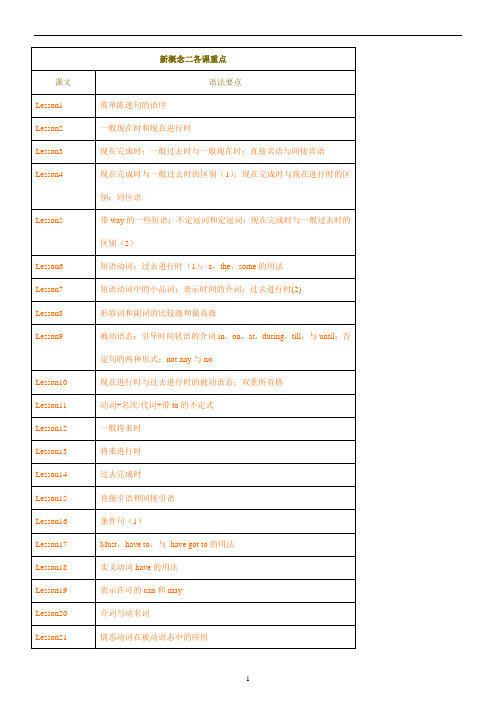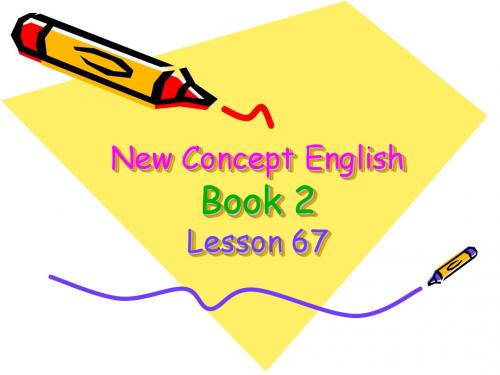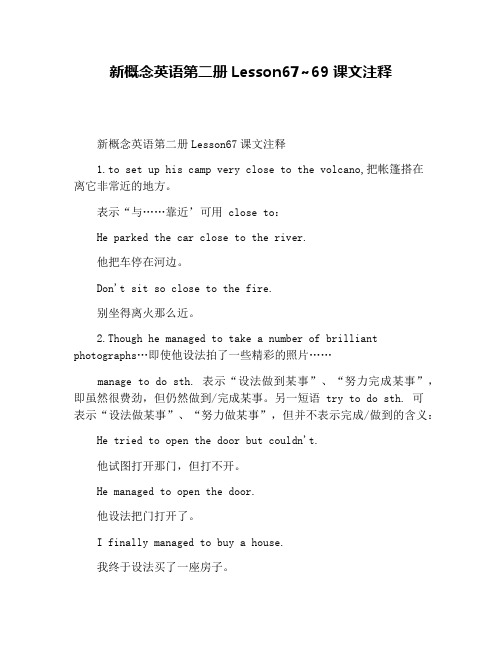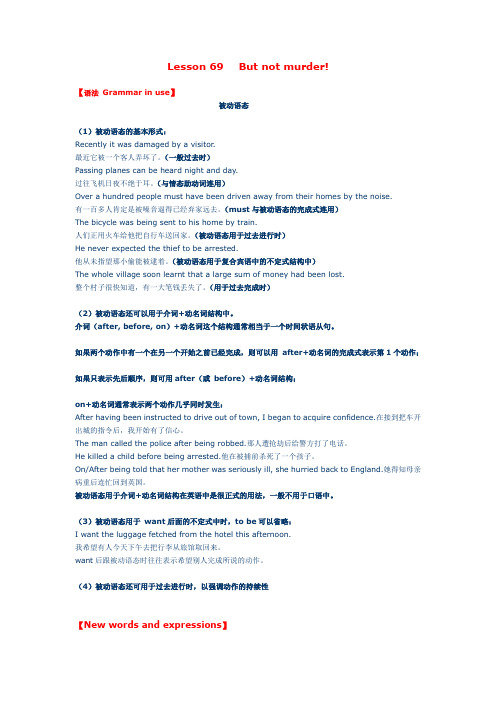新概念英语第二册Lesson67~69语法知识点(最新)
新概念英语第2册课程讲义Lesson69

Lesson 69 单词讲解1. instruct v. 命令,指示instruct sb to do sth.instruction n. 指导,说明follow the instruction2. confidence n. 信心confident adj. 有信心的self-confidence n. 自信心self-confident adj. 有自信心的3. examiner n. 主考人examine v. 检查examination n. 检查,考试( exam )4. suppose v. 假设Let us suppose that …be supposed to doYou are supposed to tell me what to do.She is not supposed to be here.Lesson 69 课文&语法讲解Key points: 复习被动语态非谓语动词having been done1. I was being tested for a driving licence ...2. I had been asked to drive in heavy traffic ...be done被动语态3. After having been instructed to drive out of town, I began to ...having been done非谓语动词表示被动,发生在先非谓语动词表示被动Beaten by a girl, the boy cried.(done)Having been beaten by a girl, the boy cried.(having been done)Being beaten by a girl, the boy cried.(being done)having been done 练习:已经被告诉了很多次,他还是犯相同的错误。
新概念英语第2册全套详细语法精粹

新概念语法精粹Guide to New Concept English Grammar(二册初级班)第一章 英语动词时态(Tenses)英语时态是英语语法中的第一道难关,攻下此难关是作文、阅读、口语之关键。
汉语用不同词表达相应时态,而英语用同一词的不同变化形式表达时态。
英语各种时态构成表:以play 为例:现在play plays is am playing arehas have played 过去played was were playinghad played had been playing 将来shall will play shall will be playing shall will have played shall will have been playing过去将来should would play should would be playing should would have played should would have been playing一、一般现在时:1.构成:使用动词原形,第三人称单数须有变化。
(1)直接加“s ”,works ,takes(2)以辅音加“y ”结尾,变“y ”为“i ”,再加“es ”carry → carries(3)以“o, s, x, ch, sh ”结尾的动词加“es ”goes dresses watches brushes2.功能:(1)表现在的事实、状态或动作:eg: ►. Birds fly.►. She loves music.►. Mary's parents get up very early.(2)表习惯性动作或职业,常与often ,sometimes ,usually ,always ,every week ,seldom ,occasionally ,frequently 等时间副词连用。
eg: ►. I always take a walk after supper.►. She writes to me very often.►. Tom and his girlfriend go out to take a picnic occasionally.(3►. The earth moves round the sun.►. The sun rises in the east and sets in the west.►. Two and two makes four.人非圣贤,熟能无过。
新版 新概念英语二册讲义--67

• violent adj. 猛烈的, 激烈的,暴力的 • violent attack • 暴力袭击
• violence n. 猛烈,强烈,暴力,暴虐,暴 行
• violence in the television • Twenty people were killed in the violence. • 有20人在这一暴力事件中丧生。 • They are threatened with violence. • 他们受到暴力的威胁。
• n. brilliance
精彩;才华;光亮
liquid adj. 液态的
• liquid rock • 岩浆 • 固态:solid • 气态:gas
• n. 液体 • Oil, milk and water are all liquids. • 油、牛奶和水都是液体。
escape v. 逃脱
alive adj. 活着的
• alive 做定语时一定要放在被修饰词后面 • 属于表语形容词,ahead
• She is still alive after the earthquake. • Every man alive has his/her own troubles.
• living
adj. 活着的
• living elephant
live
• adj.活着的,现场的(永远不和人连用) • live fish 活鱼 • live concert 现场演唱会
• live:指活生生的,生气勃勃的;还可表示 现场直播的。
• living:反义词为dead,指包括人和动植物 的生命没有消失、仍然存在的状态。
Lesson 67 Volcanoes
新概念英语二册 67

4. to escape just in time in time..表明”及时”
I caught the train just in time.
Key points 学习要点
5. He has been able to tell us more about active volcanoes than any man alive.
Words/phrases 单词与词组
一生 活火山 在世界各地 能够去做… 威胁 包围 及时 量温度 冒着生命危险
1. Haroun Tazieff has spent his lifetime studying active volcanoes and deep caves. spend time/money (in) doing sth… The Smith has spent a lot of time and money building the new house. 2. to set up his camp very close to the volcano, close to…为副词,表 “接近地, 紧密地” Don’t sit too close to the fire.
Words/phrases 单词与词组
n. 火山 j. 活动的 n. 基伍湖 n. 刚果 n. 基图罗 v. (火山)喷发 adv. 猛烈地,剧烈地 v. 设法 adj. 精彩的 adj. 液态的 v. 逃脱 adj. 活着的 adj. 波兰的 v. 观察
Words/phrases 单词与词组
be able to 表示 “能够”, 将来时: will be able to… 当表示成功地完成过去某个动作时, 用 was able to… 1) Jane can’t swim, but she will be able to swim in a few months. 2) The plane was able to rise up after two heavy bags had been thrown out.
新概念英语第二册Lesson67~69课文注释

新概念英语第二册Lesson67~69课文注释新概念英语第二册Lesson67课文注释1.to set up his camp very close to the volcano,把帐篷搭在离它非常近的地方。
表示“与……靠近’可用 close to:He parked the car close to the river.他把车停在河边。
Don't sit so close to the fire.别坐得离火那么近。
2.Though he managed to take a number of brilliant photographs…即使他设法拍了一些精彩的照片……manage to do sth. 表示“设法做到某事”、“努力完成某事”,即虽然很费劲,但仍然做到/完成某事。
另一短语 try to do sth. 可表示“设法做某事”、“努力做某事”,但并不表示完成/做到的含义:He tried to open the door but couldn't.他试图打开那门,但打不开。
He managed to open the door.他设法把门打开了。
I finally managed to buy a house.我终于设法买了一座房子。
3.a river of liquid rock,一股岩浆。
river在这里为比喻用法,表示“(……的)巨流”。
因为 a river of 这个结构中没有 as, like等明确表示“像”的词,所以,它是一种暗喻。
When she heard the news, a river of tears came down her face.她听到这个消息后,泪如泉涌。
Rivers of blood flowed during World war Ⅱ.第二次世界大战期间血流成河。
4.It threatened to surround him completely…(岩浆)眼看就要将他团团围住……threaten表示“威胁着要”、“恐吓”:The forest fire threatened to destroy the town.森林大火眼看就要将这个镇子焚毁。
新概念第二册课堂笔记Lesson 69

Lesson 69 But not murder!【语法Grammar in use】被动语态(1)被动语态的基本形式:Recently it was damaged by a visitor.最近它被一个客人弄坏了。
(一般过去时)Passing planes can be heard night and day.过往飞机日夜不绝于耳。
(与情态助动词连用)Over a hundred people must have been driven away from their homes by the noise.有一百多人肯定是被噪音逼得已经弃家远去。
(must与被动语态的完成式连用)The bicycle was being sent to his home by train.人们正用火车给他把自行车送回家。
(被动语态用于过去进行时)He never expected the thief to be arrested.他从未指望那小偷能被逮着。
(被动语态用于复合宾语中的不定式结构中)The whole village soon learnt that a large sum of money had been lost.整个村子很快知道,有一大笔钱丢失了。
(用于过去完成时)(2)被动语态还可以用于介词+动名词结构中。
介词(after, before, on)+动名词这个结构通常相当于一个时间状语从句。
如果两个动作中有一个在另一个开始之前已经完成,则可以用after+动名词的完成式表示第1个动作;如果只表示先后顺序,则可用after(或before)+动名词结构;on+动名词通常表示两个动作几乎同时发生:After having been instructed to drive out of town, I began to acquire confidence.在接到把车开出城的指令后,我开始有了信心。
新概念英语第二册知识点总结
新概念英语第二册知识点总结一、语法知识点。
1. 时态。
- 一般现在时。
- 用法:表示经常发生的动作或存在的状态,客观事实或真理等。
例如:He often goes to school by bike.(表示经常的动作)The earth moves around the sun.(客观真理)- 动词形式:主语为第三人称单数时,动词要加 -s或 -es,其余情况用原形。
- 一般过去时。
- 用法:表示过去某个时间发生的动作或存在的状态。
例如:I saw him yesterday.- 动词形式:规则动词一般在词尾加 -ed,不规则动词有特殊变化(如go - went,see - saw等)。
- 现在进行时。
- 用法:表示此时此刻正在进行的动作,也可表示现阶段正在进行但此刻不一定在做的动作。
例如:She is reading a book now.(此刻正在读)He is working on a project this month.(现阶段正在做)- 动词形式:be动词(am/is/are)+动词的 -ing形式。
- 过去进行时。
- 用法:表示过去某个时刻或某段时间正在进行的动作。
例如:When I called him, he was having dinner.- 动词形式:be动词(was/were)+动词的 -ing形式。
- 现在完成时。
- 用法:表示过去发生的动作对现在造成的影响或结果,或者表示从过去开始一直持续到现在的动作或状态。
例如:I have lost my key.(过去丢钥匙,现在找不到)He has lived here for ten years.(从过去住到现在,持续了十年)- 动词形式:have/has +过去分词。
- 过去完成时。
- 用法:表示在过去某个时间或动作之前已经发生或完成的动作,即“过去的过去”。
例如:When I got to the station, the train had already left.- 动词形式:had +过去分词。
新概念英语第二册语法知识点Lesson69_71
新概念英语第二册语法知识点Lesson69~71新概念英语第二册语法知识点Lesson69被动语态(1)在第10课、第21课、第34课、第45课与第58课的语法中,我们学习了被动语态的基本形式、它与情态助动词的连用、它在动词+宾语+不定式结构中的使用以及它在过去完成时中的使用:Recently it was damaged by a visitor.最近它被一个客人弄坏了。
(一般过去时)Passing planes can be heard night and day.过往飞机日夜不绝于耳。
(与情态助动词连用)Over a hundred people must have been driven away from their homes by the noise.有一百多人肯定是被噪音逼得已经弃家远去。
(must与被动语态的完成式连用)The bicycle was being sent to his home by train.人们正用火车给他把自行车送回家。
(被动语态用于过去进行时)He never expected the thief to be arrested.他从未指望那小偷能被逮着。
(被动语态用于复合宾语中的不定式结构中)The whole village soon learnt that a large sum of money had been lost.整个村子很快知道,有一大笔钱丢失了。
(用于过去完成时)(2)被动语态还可以用于介词+动名词结构中。
介词(after, before, on)+动名词这个结构通常相当于一个时间状语从句。
如果两个动作中有一个在另一个开始之前已经完成,则可以用 after+动名词的完成式表示第1个动作;如果只表示先后顺序,则可用after(或 before)+动名词结构; on+动名词通常表示两个动作几乎同时发生:After having been instructed to drive out of town, I began to acquire confidence.在接到把车开出城的指令后,我开始有了信心。
新概念第二册课文翻译及学习笔记【Lesson67、68、69】
【导语】新概念英语作为⼀套世界闻名的英语教程,以其全新的教学理念,有趣的课⽂内容和全⾯的技能训练,深受⼴⼤英语学习者的欢迎和喜爱。
为了⽅便同学们的学习,为⼤家整理了⾯的新概念第⼆册课⽂翻译及学习笔记,希望为⼤家的新概念英语学习提供帮助!《新概念英语》第⼆册第67课:Volcanoes【课⽂】Haroun Tazieff, the Polish scientist, has spent his lifetime studying active volcanoes and deep caves in all parts of the world. In 1948, he went to Lake Kivu in the Congo to observe a new volcano which he later named Kituro. Tazieff was able to set up his camp very close to the volcano while it was erupting violently. Though he managed to take a number of brilliant photographs, he could not stay near the volcano for very long. He noticed that a river of liquid rock was coming towards him. It threatened to surround him completely, but Tazieff managed to escape just in time. He waited until the volcano became quiet and he was able to return two days later. This time, he managed to climb into the mouth of Kituro so that he could take photographs and measure temperatures. Tazieff has often risked his life in this way. He has been able to tell us more about active volcanoes than any man alive.【课⽂翻译】波兰科学家哈罗恩·塔捷耶夫花了毕⽣的精⼒来研究世界各地的活⽕⼭和深洞. 1948年他去了刚果的基伍湖, 对⼀座后来被他命名为基图罗的新⽕⼭进⾏观察. 当⽕⼭正在猛烈地喷发时, 塔捷耶夫有办法把帐篷搭在离它⾮常近的地⽅. 尽管他设法拍了⼀些⼗分精彩的照⽚, 但他却不能在⽕⼭附近停留太长的时间. 他发现有⼀股岩浆正向他流过来, 眼看就要将他团团围住, 但塔捷耶夫还是设法及时逃离了. 他等到⽕⼭平静下来, 两天以后⼜返回去. 这次他设法爬进了基图罗⽕⼭⼝, 以便能拍摄照⽚和测试温度. 塔捷耶夫经常冒这样的⽣命危险. 他能告诉我们的有关活⽕⼭的情况⽐任何在世的⼈都要多.【⽣词汇总】volcano n. ⽕⼭active adj. 活动的Kivu n. 基伍湖Congo n. 刚果Kituro n. 基图罗erupt v. (⽕⼭)喷发violently adv. 猛烈地,剧烈地manage v. 设法brilliant adj. 精彩的liquid [5likwid] adj. 液态的;n. 液体escape v. 逃脱alive adj. 活着的【短语汇总】set up建⽴manage to do设法做某事【知识点讲解】1,manage to do指的是设法办成了某事,侧重于结果,强调办成了,这就是他和try to do 的区别2,close to 离……很近,与……靠近He parked the car close to the river.Don’t sit so close to the fire.3,risk⽤法汇总risk one’s life 冒着⽣命危险take a risk of… =at a risk of… 冒着……的危险risk sth.=risk losing sth. 冒着失去……的危险risk doing sth. 冒着做……的危险《新概念英语》第⼆册第68课:persistent【课⽂】I crossed the street to avoid meeting him, but he saw me and came running towards me. It was no use pretending that I had not seen him, so I waved to him. I never enjoy meeting Nigel Dykes. He never has anything to do. No matter how busy you are, he always insists on coming with you. I had to think of a way of preventing him from following me around all morning.'Hello, Nigel,' I said. 'Fancy meeting you here!''Hi, Elizabeth,' Nigel answered. 'I was just wondering how to spend the morning -- until I saw you. You're not busy doing anything, are you?''No, not at all,' I answered. 'I'm going to...''Would you mind my coming with you?' he asked, before I had finished speaking.'Not at all,' I lied, 'but I'm going to the dentist.''Then I'll come with you,' he answered. 'There's always plenty to read in the waiting room!’【课⽂翻译】我穿过马路以便避开他, 但他看到我并朝我跑过来. 若再装作没看见他已是没有⽤了, 我只好向他招⼿。
(完整版)新概念英语第二册笔记_第67课
Lesson 67 Volcanoes 火山【Text 】Haroun T azieff, the Polish scientist, has spent his lifetime studying active volcanoes and deep caves in all parts of the world. In 1948, he went to Lake Kivu in the Congo to observe a new volcano which he later named Kituro. Tazieff was able to set up his camp very close to the volcano while it was erupting violently. Though he managed to take a number of brilliant photographs, he could not stay near the volcano for very long. He noticed that a river of liquid rock was coming towards him. It threatened to surround him completely, but T azieff managed to escape just in time. He waited until the volcano became quiet and be was able to return two days later . This time, he managed to climb into the mouth of Kituro so that he could take photographs and measure temperatures. Tazieff has often risked his life in this way. He has been able to tell us more about active volcanoes than any man alive.【课文翻译】波兰科学家哈罗恩·塔捷耶夫花了毕生的精力来研究世界各地的活火山和深洞。
- 1、下载文档前请自行甄别文档内容的完整性,平台不提供额外的编辑、内容补充、找答案等附加服务。
- 2、"仅部分预览"的文档,不可在线预览部分如存在完整性等问题,可反馈申请退款(可完整预览的文档不适用该条件!)。
- 3、如文档侵犯您的权益,请联系客服反馈,我们会尽快为您处理(人工客服工作时间:9:00-18:30)。
新概念英语第二册Lesson67语法知识点表示“能力”的情态助动词及其他有关的动词: can/ could, be able to 与 manage to(1)在第43课的语法中,我们学习了表示“能力”的 can/could。
用将来时的句子中表示“能力”时通常用 will be able to, 在表示成功地完成过去某个动作时用was able to而不用could:I can't remember where I've seen him.我想不起来我在什么地方见过他。
I can sing some songs, but I can't play the piano.我会唱一些歌,但我不会弹钢琴。
He thought he could pass the exam easily, but he failed.他以为他能轻易地通过考试,结果他没通过。
After Byrd had ordered his men to throw out two heavy food sacks, the plane was then able to rise.在伯德命令他的助手们扔掉两个沉重的食物袋之后,飞机才可以上升了。
Jane can't swim yet. She'll be able to swim in a few months time.简不会游泳。
再过几个月她就会游泳了。
(2)表示“能力”的另一种方式是用 manage to。
在表示成功地完成过去某个动作时,它经常代替 be able to。
与 be able to相比,它更强调“虽然困难很大,但仍能……”这种含义。
试比较:He finished the job yesterday.他昨天把工作做完了。
(陈述一个事实)He was able to finish the job yesterday.他昨天把工作做完了。
(表示可能)He managed to finish the job yesterday.他昨天设法把工作做完了。
(暗示他克服了不少困难才完成)如果把最后这句话改成:He was able to watch it after all(他最终看了那场比赛),那么他就不一定是克服困难才看到比赛,而可能是因为情况有变化等。
新概念英语第二册Lesson68语法知识点动名词的一些用法(1)在第20课的语法中,我们学习了动名词的基本形式和作用,在第44课的语法中,我们学习了动名词用于某些短语动词(look forward to, be used to等)之后、一些表示喜好的动词(hate, love, prefer等)之后不定式与动名词的区别以及 need 和want之后动名词的用法等:I like watching TV.我喜欢看电视。
(一般行为)I'd like to watch TV.我(现在)想看电视。
(特定)The strap needs mending.这提包带需要修理。
(动名词在这里有被动的含义)(2)有些动词后可以用动名词作宾语,但不能用不定式。
这些动词包括 avoid, admit, deny, fancy, finish, enjoy, mind(在乎,在意),suggest, stand(容忍)等:I tried to avoid meeting him.我试图避开他。
I never enjoy meeting Nigel Dykes.我就怕遇到奈杰尔·戴克斯。
I haven't finished speaking yet.我还没有说完。
(3)有些结构通常要接动名词,如 busy, worth, it is no/little use, bored with, interested in, insist on, prevent…from等:I'm busy making meat pies.我正忙着做肉馅饼。
A Lancaster bomber in reasonable condition is worth rescuing.一架状况尚好的兰开斯特轰炸机值得抢救。
He insisted on paying.他坚持要付钱。
I'm interested in acting.我对表演感兴趣。
(4)动名词可以有自己的逻辑主语(即动作执行者,而不是句子的主语):He insisted on my paying the bill.他坚持要我付账。
I don't think the children enjoy your/his/John's singing.我不认为孩子们喜欢你/他/约翰唱的歌。
Please excuse his not writing to you.请原谅他没有给你写信。
Do you mind my smoking?我可以抽烟吗?Do you mind opening/my opening the door?你/我可以开门吗?(5)come和go之后可以跟与户外活动相关的动名词(climbing, driving, fishing, riding, shopping, walking等),表示建议、邀请或叙事:Why don't we go swimming?为什么我们不去游泳呢?Come dancing this evening.今晚来跳舞吧。
Yesterday we went fishing.昨天我们去钓鱼了。
(6)感知动词(hear, see, feel, watch等)后面既可以跟宾语加分词结构,也可以跟宾语加不带to的不定式。
现在分词往往强调动作正在发生,用于叙述中时使人身临其境;不定式则可以表示动作发生了或过程结束了。
有时它们之间的区别不大,可以互相替换使用。
试比较:I watched him climb/climbing the tree.我看到他爬树了。
(区别不大)新概念英语第二册Lesson69语法知识点被动语态(1)在第10课、第21课、第34课、第45课与第58课的语法中,我们学习了被动语态的基本形式、它与情态助动词的连用、它在动词+宾语+不定式结构中的使用以及它在过去完成时中的使用:Recently it was damaged by a visitor.最近它被一个客人弄坏了。
(一般过去时)Passing planes can be heard night and day.过往飞机日夜不绝于耳。
(与情态助动词连用)Over a hundred people must have been driven away from their homes by the noise.有一百多人肯定是被噪音逼得已经弃家远去。
(must与被动语态的完成式连用)The bicycle was being sent to his home by train.人们正用火车给他把自行车送回家。
(被动语态用于过去进行时)He never expected the thief to be arrested.他从未指望那小偷能被逮着。
(被动语态用于复合宾语中的不定式结构中)The whole village soon learnt that a large sum of money had been lost.整个村子很快知道,有一大笔钱丢失了。
(用于过去完成时)(2)被动语态还可以用于介词+动名词结构中。
介词(after, before, on)+动名词这个结构通常相当于一个时间状语从句。
如果两个动作中有一个在另一个开始之前已经完成,则可以用 after+动名词的完成式表示第1个动作;如果只表示先后顺序,则可用after(或 before)+动名词结构; on+动名词通常表示两个动作几乎同时发生:After having been instructed to drive out of town, I began to acquire confidence.在接到把车开出城的指令后,我开始有了信心。
The man called the police after being robbed.那人遭抢劫后给警方打了电话。
He killed a child before being arrested.他在被捕前杀死了一个孩子。
On/After being told that her mother was seriously ill, she hurried back to England.她得知母亲病重后连忙回到英国。
被动语态用于介词+动名词结构在英语中是很正式的用法,一般不用于口语中。
(3)被动语态用于 want后面的不定式中时,to be可以省略:I want the luggage fetched from the hotel this afternoon.我希望有人今天下午去把行李从旅馆取回来。
want后跟被动语态时往往表示希望别人完成所说的动作。
(4)被动语态还可用于过去进行时,以强调动作的持续性:I 'd like to ask a few questions about your latest film.我想就您最近拍的电影问几个问题。
Not again! I was being asked about the film all day yesterday! 又来了!昨天一整天都有人问我这电影的事!。
